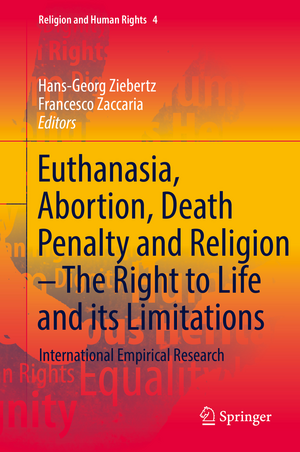Euthanasia, Abortion, Death Penalty and Religion - The Right to Life and its Limitations: International Empirical Research: Religion and Human Rights, cartea 4
Editat de Hans-Georg Ziebertz, Francesco Zaccariaen Limba Engleză Hardback – 27 noi 2018
The papers focus on three limitations of the right to life: the death penalty, abortion, and euthanasia. The contributors explore how young people understand and evaluate the right to life and its limitations. The book presents unique empirical research among today's youth and reveals that, among other concepts, religiosity matters. It provides insight into the acceptance, perception, and legitimation of human rights by people from different religious and cultural backgrounds.
This investigation rigorously tests for inter-individual differences regarding political and judicial rights on religious grounds, while controlling for other characteristics. It will help readers better understand the many facets of this fundamental, yet controversial, philosophical question. The volume will be of interest to students, researchers, as well as general readers searching for answers.
Preț: 695.74 lei
Preț vechi: 915.45 lei
-24% Nou
Puncte Express: 1044
Preț estimativ în valută:
133.15€ • 138.64$ • 112.53£
133.15€ • 138.64$ • 112.53£
Carte tipărită la comandă
Livrare economică 03-10 martie
Preluare comenzi: 021 569.72.76
Specificații
ISBN-13: 9783319987729
ISBN-10: 3319987720
Pagini: 220
Ilustrații: VIII, 306 p. 9 illus.
Dimensiuni: 155 x 235 mm
Greutate: 0.62 kg
Ediția:1st ed. 2019
Editura: Springer International Publishing
Colecția Springer
Seria Religion and Human Rights
Locul publicării:Cham, Switzerland
ISBN-10: 3319987720
Pagini: 220
Ilustrații: VIII, 306 p. 9 illus.
Dimensiuni: 155 x 235 mm
Greutate: 0.62 kg
Ediția:1st ed. 2019
Editura: Springer International Publishing
Colecția Springer
Seria Religion and Human Rights
Locul publicării:Cham, Switzerland
Cuprins
Chapter 1. The right to life questioned. Introductory remarks (Hans-Georg Ziebertz).- Chapter 2. Religion and the right to (dispose of) life. A study of the attitude of Christian, Muslim and Hindu students in India concerning death penalty, euthanasia and abortion (Francis-Vincent Anthony).- Chapter 3. The Right to Life among Chilean Youth (Jorge Manzi).- Chapter 4. Human dignity, religious ethics or hedonism - what predicts youth’ attitudes in Germany towards the right to life in case of euthanasia and abortion? (Hans-Georg Ziebertz).- Chapter 5. The impact of religion on attitudes towards abortion and euthanasia. An empirical study among Italian students (Francesco Zaccaria).- Chapter 6. Religion, human rights and matters of life and death: Exploring attitude toward abortion and euthanasia among adolescents in England and Wales (Leslie J. Francis).- Chapter 7. The Right to Life: A Perspective of Young Palestinian Muslims (Raymond J. Webb).- Chapter 8. Attitudes toward Right to Life and Religiosity of Young People in Lithuania (Milda Ališauskienė).- Chapter 9. Death penalty and the right to life. A comparative empirical study in Tanzania and Nigeria (Clement Fumbo).- Chapter 10. Religion and attitudes towards abortion and euthanasia among young people in Poland and Norway (Pål Ketil Botvar).- Chapter 11. Religion, trust in institutions and attitudes towards abortion: a comparison between Lutheran and Orthodox countries (Olga Breskaya).
Notă biografică
Prof. Dr. Hans-Georg Ziebertz is Professor for Practical Theology, University of Würzburg, Germany. He is coordinator of the international research project “Religion and Human Rights”, many publications on these issues.
Francesco Zaccaria is Adjunct Professor of Pastoral Theology, Apulian Theological Faculty, Bari, Italy.
Textul de pe ultima copertă
This book considers how the termination of life might be accepted in the view of a general obligation to protect life. It features more than 10 papers written by scholars from 14 countries that offer international comparative empirical research. Inside, readers will find case studies from such areas as: India, Chile, Germany, Italy, England, Palestine, Lithuania, Nigeria, and Poland.
The papers focus on three limitations of the right to life: the death penalty, abortion, and euthanasia. The contributors explore how young people understand and evaluate the right to life and its limitations. The book presents unique empirical research among today's youth and reveals that, among other concepts, religiosity matters. It provides insight into the acceptance, perception, and legitimation of human rights by people from different religious and cultural backgrounds.
This investigation rigorously tests for inter-individual differences regarding political and judicial rights on religious grounds, while controlling for other characteristics. It will help readers better understand the many facets of this fundamental, yet controversial, philosophical question. The volume will be of interest to students, researchers, as well as general readers searching for answers.
The papers focus on three limitations of the right to life: the death penalty, abortion, and euthanasia. The contributors explore how young people understand and evaluate the right to life and its limitations. The book presents unique empirical research among today's youth and reveals that, among other concepts, religiosity matters. It provides insight into the acceptance, perception, and legitimation of human rights by people from different religious and cultural backgrounds.
This investigation rigorously tests for inter-individual differences regarding political and judicial rights on religious grounds, while controlling for other characteristics. It will help readers better understand the many facets of this fundamental, yet controversial, philosophical question. The volume will be of interest to students, researchers, as well as general readers searching for answers.
Caracteristici
Explores how young people legitimize the boundaries of the right to life Presents unique empirical research among youth Offers insights from different religious and cultural backgrounds









